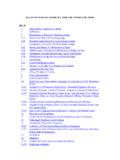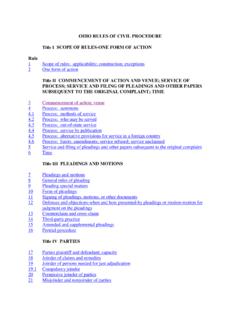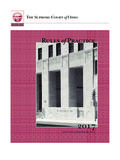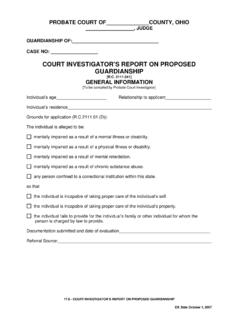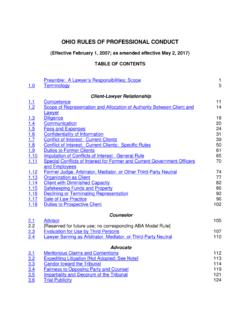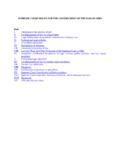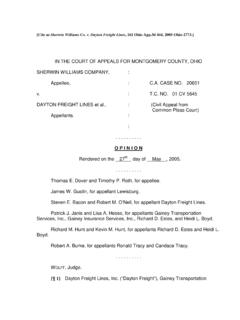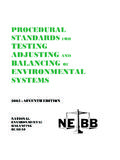Transcription of SUPREME COURT RULES FOR THE GOVERNMENT OF THE BAR …
1 SUPREME COURT RULES FOR THE GOVERNMENT OF THE BAR OF OHIO Rule I Admission to the practice of law II Limited practice of law by a legal intern III Legal Professional Associations Authorized to Practice Law IV Professional responsibility V Disciplinary procedure VI Registration of attorneys VII Unauthorized practice of law VIII Lawyers Fund for Client Protection of the SUPREME COURT of Ohio IX Temporary certification for practice in legal services, public defender, and law school programs X Continuing legal education XI Limited practice of law by foreign legal consultants XII Pro hac vice admission XIII [Reserved] XIV Certification of attorneys as specialists XV SUPREME COURT Commission on Professionalism XVI SUPREME COURT Committee for Lawyer Referral and Information Services XVII [Reserved] XX Title and effective dates APPENDICES Appendix I: Attorney Continuing Legal Education Regulations Appendix II.
2 Procedural Regulations of the Board of Professional Conduct of the SUPREME COURT Appendix III: RULES of the Ohio Board of Bar Examiners Appendix IV: Standards for Accreditation of Specialty Certification Programs for Lawyers Appendix V: Statement on Professionalism Appendix VI: Fields of Law Subject to Specialization Designation Appendix VII: Lawyer Referral and Information Services Regulations (Repealed Effective April 30, 2007) Appendix VIII: Regulations Governing Procedure On Complaints and Hearings Before the Board on the Unauthorized Practice of Law RULE I.
3 ADMISSION TO THE PRACTICE OF LAW Section 1. General Requirements. To be admitted to the practice of law in Ohio, an applicant shall satisfy all of the following requirements: (A) Be at least twenty-one years of age; (B) Have earned a bachelor s degree from an accredited college or university; (C) Have earned a or an degree from a law school that was approved by the American Bar Association at the time the degree was earned or, if not located in the United States, from a law school evaluated and approved in accordance with Section 2(C) or Section 9(C)(13) of this rule.
4 (D) Prior to taking the Ohio bar examination or being admitted without examination pursuant to Section 9 of this rule, have demonstrated that the applicant possesses the requisite character, fitness, and moral qualifications for admission to the practice of law and have been approved as to character, fitness, and moral qualifications under procedures provided in this rule; (E) Have passed both the Ohio bar examination and the Multistate Professional Responsibility Examination, or have been approved for admission without examination pursuant to Section 9 of this rule; (F) Have taken the oath of office pursuant to Section 8(A) of this rule.
5 Section 2. Preliminary Registration Requirements. (A) Every applicant who intends to take the Ohio bar examination shall file with the Office of Bar Admissions of the SUPREME COURT an Application to Register as a Candidate for Admission to the Practice of Law. The applicant shall file the registration application by the fifteenth day of November in the applicant s second year of law school. (B) The registration application shall be on forms furnished by the Office of Bar Admissions and shall include all of the following: (1) A certificate from the dean of the law school the applicant is attending, certifying that the applicant has begun the study of law.
6 (2) A properly authenticated transcript of college credits showing the applicant has earned a bachelor s degree in compliance with Section 1(B) of this rule or a certificate from the dean of the law school the applicant is attending, certifying that the applicant is participating in a three-plus-three program; (3) Fingerprint identification taken by a sheriff, deputy sheriff, municipal police officer, or state highway patrol officer; (4) A registration fee of seventy-five dollars; (5) A fee in the amount charged by the National Conference of Bar Examiners for its character investigation and report; (6) A completed character questionnaire, in duplicate, in the form prescribed by the Board of Commissioners on Character and Fitness; (7) Authorization and release forms in the number required by the Office of Bar Admissions.
7 (C) If an applicant s undergraduate or legal education was not received in the United States, an additional fee of one hundred fifty dollars shall accompany the application for the evaluation of the applicant s education. The SUPREME COURT shall review the applicant s education and determine whether the education is equivalent to the education required of applicants educated in the United States. In order to receive a review of education received outside of the United States, an applicant must submit the following documents with the registration application: (1) If an applicant s undergraduate education was not received in the United States, the applicant must submit an education evaluation completed by an education evaluation service approved by the COURT .
8 The applicant s education evaluation from an education evaluation service must show that the applicant has completed at least three years of fulltime post-secondary education in order for the COURT to find undergraduate educational equivalence. The COURT may find undergraduate equivalence where an applicant s education evaluation shows that the applicant has completed at least two years of fulltime post-secondary education, provided the applicant also submits an educational evaluation showing that the applicant s secondary education included study equivalent to one year of undergraduate study.
9 The registration application shall be processed while the applicant s undergraduate education is evaluated by the COURT . (2) If an applicant s legal education was not received in the United States, the applicant must submit an education evaluation completed by an education evaluation service approved by the COURT and a properly authenticated transcript showing successful completion of thirty credit hours of courses taken at a law school approved by the American Bar Association. Twenty of the thirty hours of coursework must be chosen from a list of courses specified by the COURT ; the remaining ten hours of coursework do not have to be chosen from the list of courses.
10 The thirty hours of coursework must be completed within a period not greater than forty-eight calendar months. The applicant s education evaluation from an education evaluation service must show that the applicant has completed at least three years of fulltime post-secondary formal legal education and received a law degree in order for the COURT to find legal educational equivalence. The registration application shall not be processed until the applicant s legal education is approved by the COURT .
